- Details
- Written by: Kamran Mofid
- Hits: 1099
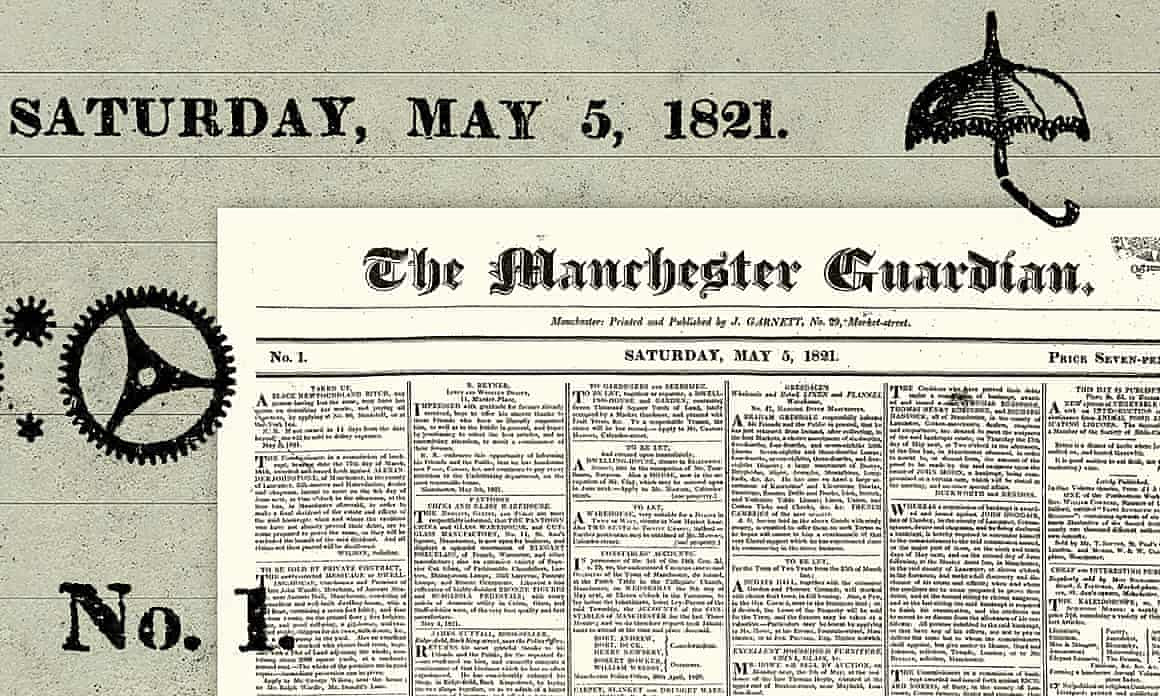
The first edition of the Guardian in 1821. Composite: Miles Probyn/The Guardian
The Guardian’s first ever edition – annotated
Nota bene
On this momentous day I wish to give my heartfelt thanks to a wonderful teacher. In 1972 I attended Oxford College of Further Education studying English as a Foriegn Language. One of my instructors, a very kind lady, as I recall, introduced us to the Guardian. We used to read a few articles a week and discuss them in the classroom.
It goes without saying that, this was life-changing for me. Since 1972 I have been reading the Guardian every single day.
I owe a lot to the Guardian for nourishing and nurturing my intellectual development and for sustaining me in this challenging and troubled world. I would not have been who I am and what I do and believe without the Guardian. For that I can not be grateful enough.
Thank you also to that kind lady in Oxford College for her initial introduction.
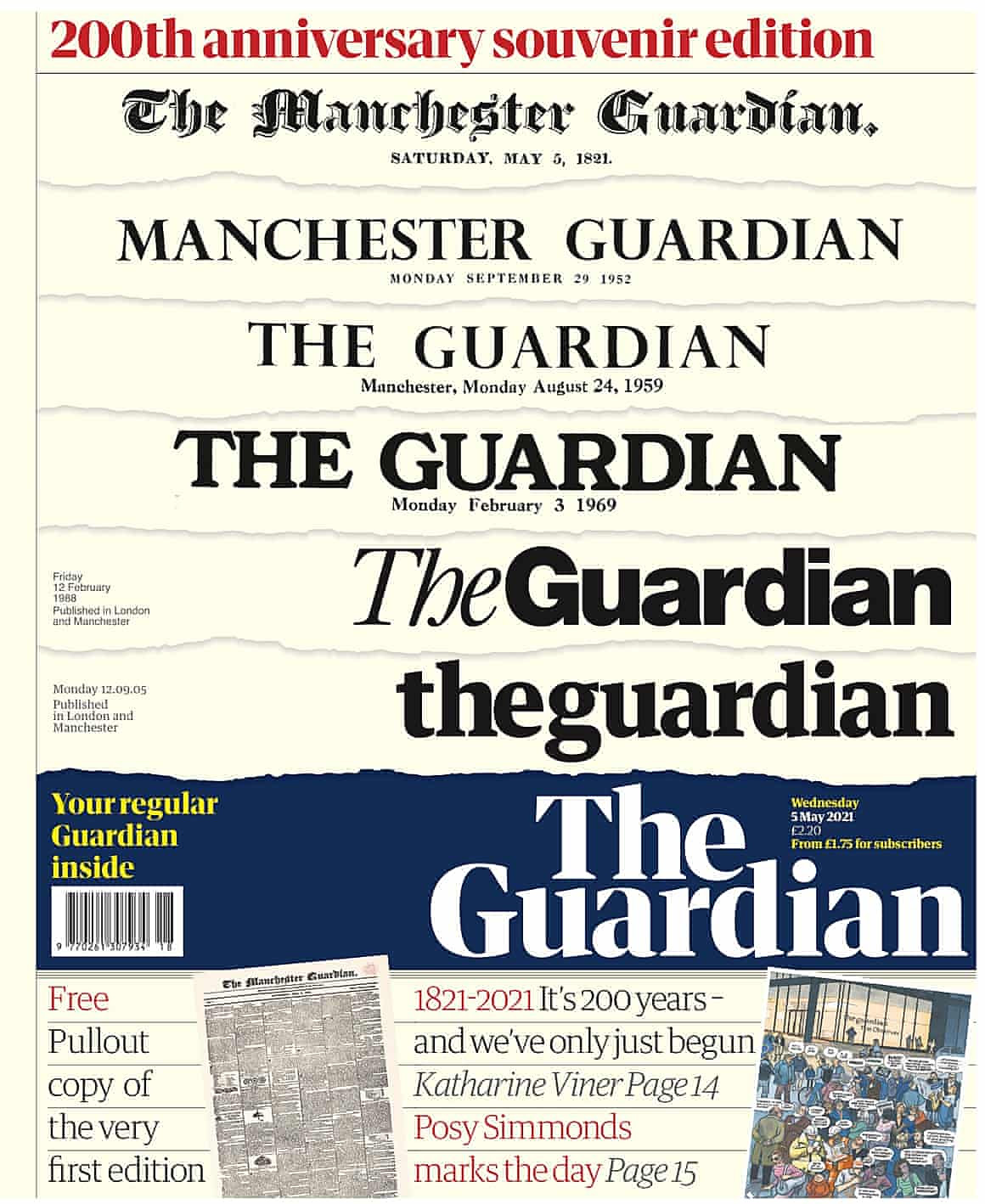
'Today marks a very special moment in the history of the Guardian. It is exactly 200 years since a Saturday in 1821 when, in the aftermath of the Peterloo massacre, a four-page weekly first appeared in Manchester for the princely sum of seven pence. More than 54,000 editions - and several million articles - later, we're proud to say we're older than Germany, fish 'n' chips, the FA Cup, the New York Times, the bicycle and the state of Texas. The Guardian has come a long way since that first print run of 1,000 copies. Now we have tens of millions of readers around the world, and 1.5 million supporters in more than 180 countries. It is your anniversary to celebrate too, as your support galvanises our work, making possible the kind of journalism that makes a difference.'- Katharine Viner, Editor-in-chief, The Guardian
Times change but the Guardian’s values don’t: 200 years, and we’ve only just begun
For me, this is a moment to reflect on what the Guardian is for and where it is going. I had expressed my thoughts and feelings about the Guardian in an earlier posting in 2012 ‘Can the Media be for the Common Good?’ And later on in 2020 ‘I always knew that the Guardian and the BBC are the BEST’
Finally, we should know what a precious gem the Guardian is when we compare and contrast it with Murdoch’s Carnage and His Evil Empire
Happy 200th Birthday dear Guardian and Many Happy Returns.
Kamran
'The Guardian has published more than 5m pieces of journalism since 1821. With the help of staff, readers, supporters and alumni we pick 200 of the most powerful, and ask Guardian staff past and present to reflect on their enduring appeal. Day four: injustice, from race to exploitation.'
- Details
- Written by: Kamran Mofid
- Hits: 2423
‘Nature and Me'- Part V: Desperately seeking Sophia- The Wisdom of Nature

The Tree of Wisdom, Old whimsical tree in the Wicklow forest, Ireland.
Photograph by Jenny Rainbow: fineartamerica.com
‘Being in nature, or even viewing scenes of nature, reduces anger, fear, and stress and increases pleasant feelings. Exposure to nature not only makes you feel better emotionally, it contributes to your physical wellbeing, reducing blood pressure, heart rate, muscle tension, and the production of stress hormones. It may even reduce mortality. Research done in hospitals, offices, and schools has found that even a simple plant in a room can have a significant impact on stress and anxiety.’
Nature heals, Nature soothes, Nature restores, Nature connects: Yes, Nature is what makes us Human!
‘To repair our relationship with life, it is vital we take time to immerse ourselves in the ecosystems where we live, reconnecting with Earth-as-teacher.’- The Gaia Foundation
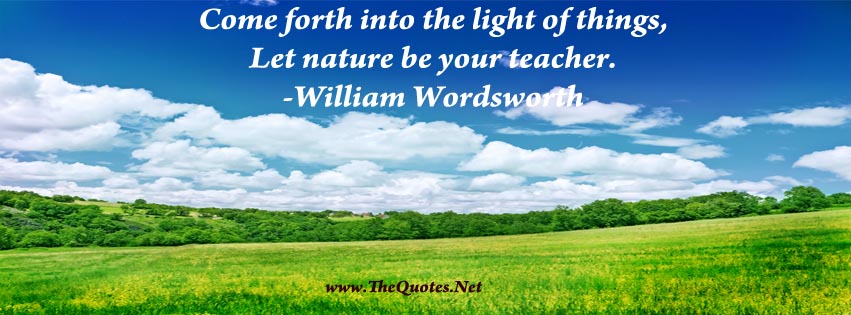
On the 250th Birthday of William Wordsworth Let Nature be our Wisest Teacher
In this troubled world let the beauty of nature and simple life be our greatest teachers
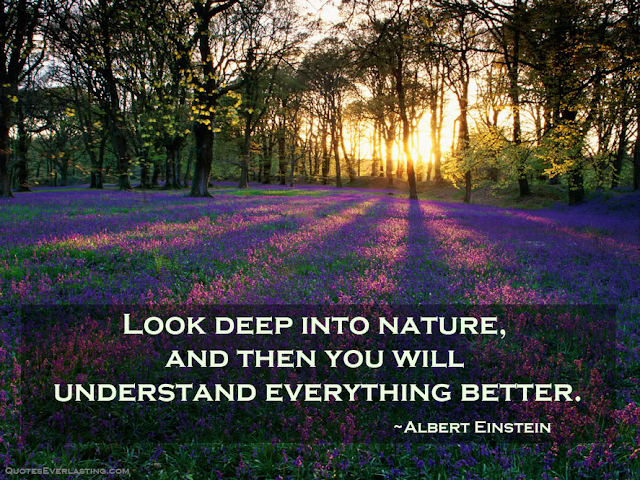
‘We are embedded in Nature” and “nature is more than a mere economic good’
‘Nature nurtures and nourishes us, so we will think of assets as durable entities
that not only have use value, but may also have intrinsic worth’
Detaching Nature from Economics is ‘Burning the Library of Life’
‘More than parent and student communities, the teaching fraternity needs to understand that the essential purpose of education is not to enable students to earn a living, but to learn how to live life. As the primal teacher, Mother Nature teaches both the secret of life, which is to respect all life, and also how to live one’s own life in harmony and balance with all creation, exemplified by the manner in which various species of the natural world live in peaceful co-existence.’
‘Picture a school where the natural environment becomes the classroom and Nature becomes one of the teachers. Even students who don't exhibit "nature smarts" will become more attuned and connected to the world around them. And as many wise people have said, we can't save something we don't love, and we can't love something we don't know. Don't we owe it to our students to help them develop their naturalist intelligence?’
Nature the Best Teacher: Re-Connecting the World’s Children with Nature
Rethinking Education at the Time of Coronavirus Crisis
Is this what the ‘modern’ urban living is all about, devoid of any spirituality,
separated from Mother Earth and divorced from Mother Nature?

Photo:123rf.com
'Humans have long been deeply moved by a still expanse of water, a deep forest, a mountain peak. After all, nature is where we find our soul and come into contact with our spirituality. Yet, most people today live in cities and spend far less time outside in green, natural spaces than the populations of only a few generations ago.’
‘As our world becomes increasingly urbanized and mental illnesses such as depression and anxiety become seemingly more prevalent, it is time we pause and consider ways to alleviate this stress. Growing numbers of psychologists claim that several of our modern stressors are due to a departure from the natural world. Since industrialization, we have become disconnected from our relationship with nature. However, there is a solution…’

Photo:coolcatteacher.com
Are you physically and emotionally drained? I know of a good and cost-free solution!
Desperately seeking Sophia: The Wisdom of Nature
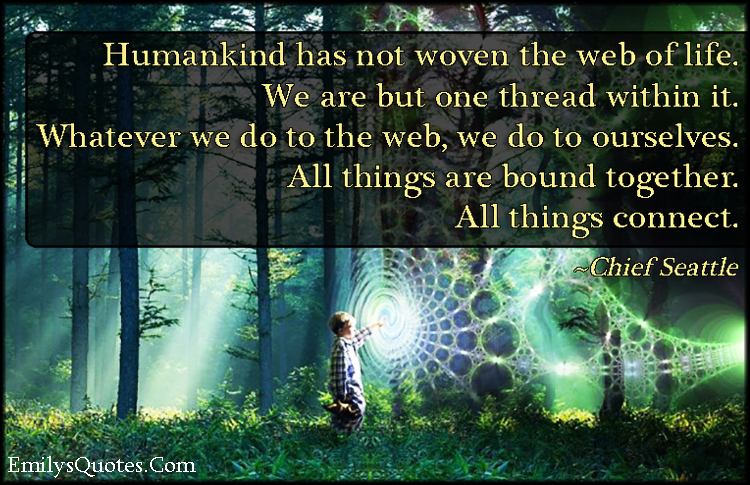
‘To repair our relationship with life, it is vital we take time to immerse ourselves in the ecosystems
where we live, reconnecting with Earth-as-teacher.’- The Gaia Foundation

‘Gaia’s Earth Jurisprudence team share five practices to help you reconnect with the Earth and your place in the web of life during Earth Jurisprudence week 2021.’
‘From befriending a tree to walking barefoot and observing the celestial bodies, these practices cultivate intimacy, awe and wonder, opening us up to the Universe as a ‘communion of subjects’ rather than a ‘collection of objects’.
Below is an overview of practices for the week. These practices can be carried over into daily life beyond Earth Jurisprudence Week to deepen your experience of being embedded in a living Universe and to support transformation to Earth-centred consciousness and culture.’
Learn more: PRACTICES FOR EARTH JURISPRUDENCE WEEK
And finally, a reflection on Human-nature Links and how to Create Better
Cities for enhanced Physical and Emotional Wellbeing
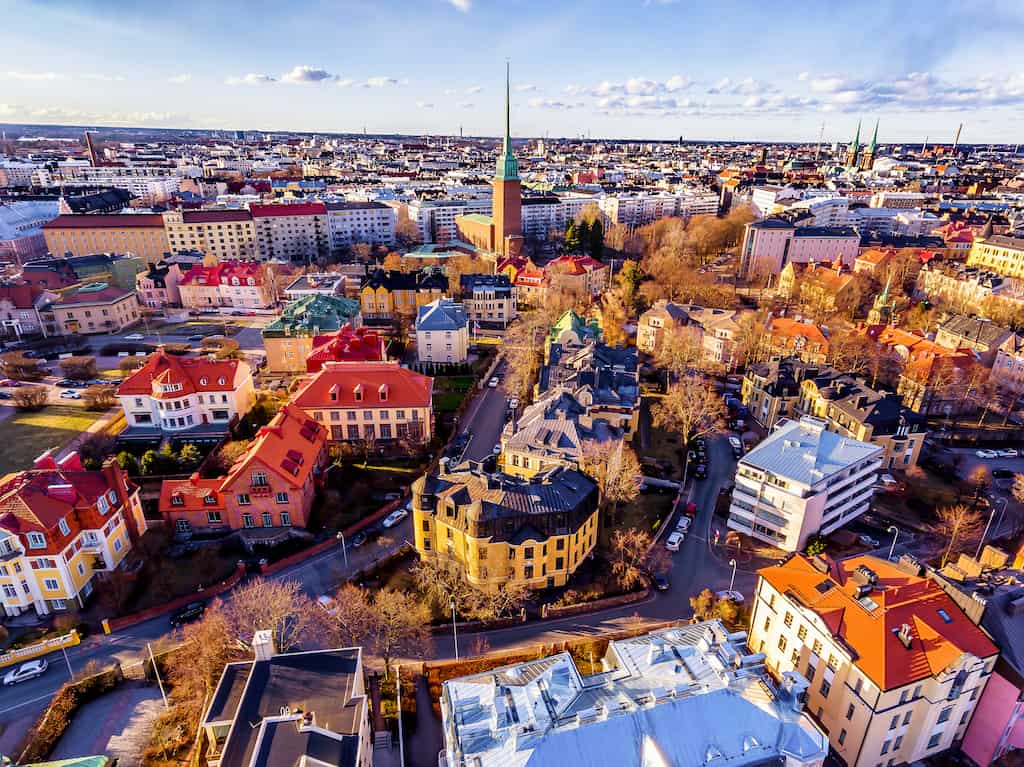
Helsinki, the Capital City of Finland, the Happiest Country.-
Photo: ScandAsia
…’Being aware of nature and its life-supporting functions, including how we as humans relate to it, is important. It helps our societies to function more sustainably and to recognise the symbiotic relationships we have with the plants and animals around us.
But as well as reflecting on and changing our relationships with the natural world we also need to rethink how we use space in a way that positions nature at the centre of things.
This will not only help to ensure that we consider the natural world and people’s wellbeing but it will also mean better access to green and blue spaces – such as parks, forests and meadows but also rivers, lakes, canals, waterfalls and even fountains. Inequality in terms of access to outdoor spaces has been highlighted during the COVID-19 lockdowns – with people having greater appreciation for the role nature can play in terms of mental and physical wellbeing…’- Slow down and embrace nature – how to create better cities when the pandemic is over
See also:
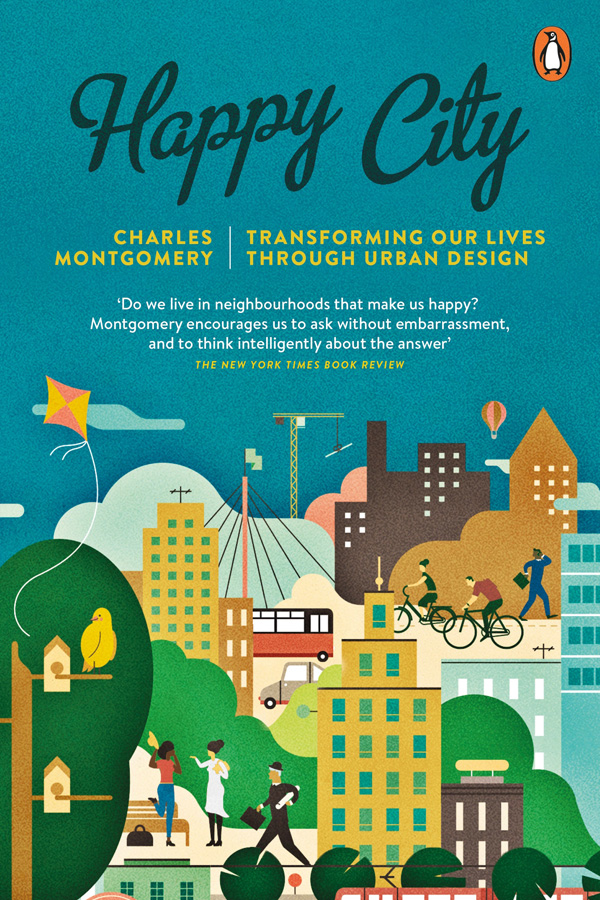
‘After decades of unchecked sprawl, more people than ever are moving back to the city. Dense urban living has been prescribed as a panacea for the environmental and resource crises of our time. But is it better or worse for our happiness? Are subways, sidewalks and tower dwelling an improvement on the car-dependence of sprawl?
Award-winning journalist Charles Montgomery finds answers to such questions at the intersection between urban design and the emerging science of happiness, during an exhilarating journey through some of the world’s most dynamic cities. He meets the visionary mayor who introduced a “sexy” lipstick-red bus to ease status anxiety in Bogotá; the architect who brought the lessons of medieval Tuscan hill towns to modern-day New York City; the activist who turned Paris’s urban freeways into beaches; and an army of American suburbanites who have transformed their lives by hacking the design of their streets and neighbourhoods.
Rich with history and new insights from psychology, neuroscience and Montgomery’s own urban experiments, Happy City is an essential tool for understanding and improving our own communities. The message is as surprising as it is hopeful: by retrofitting our cities for happiness, we can tackle the urgent challenges of our age. The happy city, the green city and the low-carbon city are the same place, and we can all help build it.’
Discover More: Happy City: Transforming Our Lives Through Urban Design
- Details
- Written by: Kamran Mofid
- Hits: 3676
A Surge of Love, Purity, Beauty and Happiness in this
Coronavirus Season of Vulnerability and Hope

Photo:Aprilierre
May, the month of Lily of Valley, Hawthorn and traditionally a season of poles and ribbons, May can be merry and romantic,
or the month when the 'love that smiled in April' blossoms into beautiful flowers of hope, purity,fertility, humility, happiness and gratitude.
Poetry is the key which unlocks the gates of Beauty, Hope and Joy
‘Reading poetry, solitude, silence and sanctuary: finding ourselves on pilgrimage of self-discovery’
- Why have some people been happier during Covid-19 pandemic? This is the Big Question
- Britain Has Become a Sinking Ship of Systemic Corruption, Cronyism and Chumocracy
- I was Boris Johnson’s boss: he is utterly unfit to be prime minister
- Reimagining Leadership: A Human Centered Approach to Finance, Banking and Business
- Education to Make us Human: What’s Kindness, Love, Compassion, or Beauty Got to Do With Teaching and Education?
